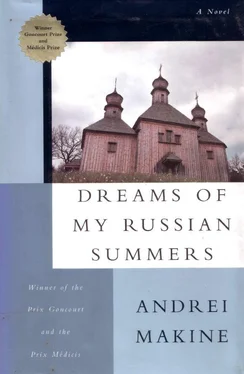As I went out into the street I thought of the camps where they used similar physical tests to sort out the prisoners. But this excessively exaggerated comparison still did not explain my unease.
It was the eagerness with which I had fulfilled the command. I came across it again in leafing through the pages of my dossier. I perceived that this desire to convince someone was everywhere present. Even though it was not asked of me in the questionnaires, I had mentioned my distant French origins. Yes, I had mentioned Charlotte, as if I wanted to ward off all objections and dissipate all skepticism in advance. And now I could not rid myself of the feeling that I had in some way betrayed her.
I had to wait several months. I was told there would be a delay until May. And at once those far-off spring days were bathed in a special radiance, standing out from the round of months and forming a universe that lived according to its own rhythm, in its own climate.
For me it was a time of preparations, but above all of long, silent conversations with Charlotte. As I walked along the streets I now had the sensation of observing them through her eyes. Of seeing, as she would have seen, an empty quay where the poplar trees, in a sudden breeze, seemed to be transmitting an urgent, whispered message to one another; of sensing, as she would have done, the resonance of the paving stones in this little old square, within whose provincial tranquility, in the heart of Paris, lay concealed the temptation of a simple happiness, of a life without dazzle.
I understood that throughout the three years of my life in France the slow and discreet progress of my project had never been interrupted. From that vague image of a woman dressed in black passing through a frontier town on foot, my dream had moved on toward a more real vision. I saw myself going to meet my grandmother at the station, and accompanying her to the hotel where she would live during her stay in Paris. Then, once the period of the bleakest poverty was finished, I had begun to picture a more comfortable interior than a hotel room, one where Charlotte would feel more at ease…
Perhaps it was thanks to these dreams that I was able to endure the poverty and humiliation that go with one's first steps in the world in which the book, that most vulnerable organ of our being, becomes merchandise. Merchandise that is hawked, exposed on market stalls, discounted. My dream was an antidote. And the Notes - a refuge.
In those few months of waiting, the topography of Paris changed. As on certain maps where the arrondissements are colored differently, the city became filled in my eyes with varied shades that Charlotte's presence gave nuances to. There were streets whose sun-drenched silence, early in the morning, held the echo of her voice. Café terraces where I guessed at her weariness at the end of a walk. A facade, a stained glass window, which under her eyes assumed the light patina of memory.
This daydream topography left a good many white patches on the colored mosaic of the arrondissements. Our outings would quite spontaneously avoid the architectural audacities of recent years. Charlotte's days in Paris would be too brief. We would not have time to come to terms with all those new pyramids, glass towers, and arches by looking at them. Their silhouettes would congeal into a strange, futuristic tomorrow, which would not disturb the eternal present of our excursions.
Nor did I want Charlotte to see the district where I lived… Alex Bond, when he came to meet me, had exclaimed disdainfully, "For goodness sake, we're not in France here. This is Africa!" And he embarked on a harangue, whose content reminded me of the remarks of so many "new Russians." It was all there: the degeneracy of the West and the imminent end of white Europe; the invasion of the new barbarians ("including us Slavs," he had added, to be fair); a new Mahomet "who will torch all their Pompidou Centres"; and a new Genghis Khan "who will put an end to all their democratic kowtowing." Drawing inspiration from the endless procession of people of color walking past the café terrace where we were sitting, his discourse was a mixture of apocalyptic prophecies and hope for a Europe regenerated by the young blood of the barbarians, promises of a total race war, and faith in universal interbreeding… The subject fascinated him. He must sometimes have felt on the side of the moribund West, for his skin was white and his culture European, and sometimes on the side of the new Huns. "I don't care what you say," he concluded his speech, "the fact remains, there are too many of these wogs!" forgetting that a minute before it was to them that he had been entrusting the salvation of the old continent…
In my dreams our excursions made a detour round this quarter and the intellectual ferment that its reality would give rise to. Not that its population could have shocked Charlotte's sensibility. An émigré par excellence, she had always lived in the midst of an extreme multiplicity of peoples, cultures, and languages. From Siberia to the Ukraine, from the Russian North to the steppe, she had known the whole ethnic diversity of the empire's melting pot. During the war she had encountered them in hospital, facing death in absolute equality; in naked equality, as bodies undergoing surgery.
It was by no means the new population of that old district of Paris that might have upset Charlotte. If I did not want to take her there it was because you could walk along whole streets without hearing a word of French spoken. Some saw the promise of a new world in this exoticism, others, a disaster. But we were not seeking exoticism, whether architectural or human. The change of scene we would experience in our days together I thought would be much more profound.
The Paris that I was preparing to let Charlotte rediscover was an incomplete Paris and even, in some respects, illusory. I remembered Nabokov's memoirs, where he spoke of his grandfather living out his last days; as he lay in bed he believed that what he could perceive through the thick material of the curtain was the brilliance of the southern sun, with attendant clusters of mimosa. He smiled, believing himself to be in Nice, in the spring sunlight. He did not suspect that he was dying in Russia in the depths of winter, and that the sun was a lamp that his daughter had fixed up behind the curtain, to give him that happy illusion…
I knew that Charlotte, while respecting my itineraries, would see everything. The lamp behind the curtain would not deceive her. I could see the quick wink she would give me in front of some indescribable contemporary sculpture. I could hear her comments, full of very subtle humor, the delicacy of which would only serve to emphasize the dull aggressiveness of the work observed. She would also see that district, mine, which I was trying to avoid… She would go there all alone, in my absence, searching for a house in the rue de l'Ermitage where the Great War soldier once lived, the one who had given her that little ferrous splinter that as children we called "Verdun."
I also knew that I should do my very best not to talk about books. And that we would talk about them all the same, a great deal, often till late into the night. For the France that had appeared one day in the middle of the steppes of Saranza owed its birth to books. It was indeed essentially a bookish country, a country composed of words, whose rivers flowed like lines of verse, whose women wept in alexandrines and whose men quarreled in broadsides. That was how we discovered France as children, through its literary life, its verbal substance, shaped into a sonnet and honed by an author. Our family mythology attested that a little volume with a battered cover and a tarnished gilt top traveled with Charlotte on all her journeys. As the last link with France. Or perhaps as the constant possibility of magic. "There is a tune for which I'd gladly part…" How many times in the wastes of the Siberian snows had these lines shaped themselves into "a brick-built castle, faced with cornerstones,/With lofty windows, stained in crimson tones"? We confused France with her literature. And true literature was that magic, a word, a verse, a chapter of which transported us into a changeless moment of beauty.
Читать дальше












